THESES

We constantly offer B.Sc and M.Sc. thesis projects in the areas of decentralized systems security, ML security, and platform security. If you are interested in doing your B.Sc./M.Sc. thesis in these areas, please register to our Moodle course, where you will find all information on how to approach us and book a meeting to discuss your thesis.
GENERAL THESES TOPICS FOR THE FOLLOWING RESEARCH AREAS:
Decentralized systems security is receiving considerable attention nowadays from the community as it finds direct applicability in the financial sector, in the IoT sector, among many others. The thesis addresses the problem of analyzing, implementing and evaluating a number of security primitives for existing dezentralized technologies.
During the course of this thesis, the student is expected to complete the following milestones:
- Perform a survey of existing decentralized security technologies.
- Analyze and implement a selected number of technologies.
- Evaluate the performance of the devised technologies.
Advances in machine learning have enabled the widespread adoption of AI technologies, making them increasingly more present in critical decision-making processes. The massive use of ML however opens the door to unprecedented risks and challenges. The main goal of this thesis project will be to explore and address vulnerabilities of ML in adversarial settings, with focus on security and privacy. The project tasks may involve analyzing, implementing, and evaluating defensive techniques to enhance the security and privacy of ML approaches.
During the course of this thesis, the student is expected to complete the following milestones:
- Survey existing vulnerabilities of ML algorithms from a security/privacy viewpoint.
- Analyze and implement selected technologies to mitigate vulnerabilities of ML.
- Evaluate the performance of the devised technologies.
Requirements:
- Intermediate familiarity with (adversarial) machine learning
- Intermediate programming experience in Python
- Optional: Experience with Python ML framework PyTorch / TensorFlow
Digital platforms bring innovation opportunities by connecting physical and digital objects with the cloud. This also opens up new adversarial opportunities. Trusted Execution Environments (TEEs) may mitigate such threats, but they require careful design to meet performance, flexibility and security required by online applications. This thesis focuses on implementing and evaluating TEE-based solutions for platforms.
CURRENT THESES
- Leonard Cohnen, „Confidential High Performance Computing: Enabling and Securing RDMA for Confidential VMs“, M.Sc., 2024
- Kyle Rudnick, „Resilience of AMD SEV Trusted Execution Against Forking Attacks: A Security Assessment“, M.Sc., 2024
- Armin Tahan Nazif, „Bridging the Gap Between Academic and Real-world attacks Against Intelligent Malware Detection“, M.Sc., 2024
- Ardeshir Saberi Kakhki, „Security Analysis of Backdoor Attacks on Diffusion Models“, M.Sc., 2024
- Tayfun Ceylan, „TEE-based Machine Learning: Extending and Analyzing Machine Learning Algorithms for PPFL“, B.Sc., 2024/25
- Jana Ilic, „Tracing the Footprints of the Wesee Attack against AMD SEV“, B.Sc., 2024/25
- Luis Falke, „Building a Dataset of Real-World Front-Running Exploits on the Ethereum Network“, B.Sc., 2024/25
- Aleksandr Rybin, „Leveraging LLM-Generated Seeds for Mutation-Based Fuzzing in Solidity“, B.Sc., 2024/25
- Timo Lobitz, „Evaluating the Effectiveness of General Purpose Defences for Vertical Federated Learning“, M.Sc., 2024/25
FINISHED THESES
- Ricoh Handt, „Anonymity in PoW Blockchain Transactions“, B.Sc., 2024
- Tobias Krause, „Comparative Analysis of Watermarking and Image Hashing Techniques for Robust AI-Generated Content Detection“, B.Sc., 2024
- Micha Eyl, „Evaluating Client-Side Purification Techniques for Federated Learning“, M.Sc., 2024
- Kanishk Arora, „Impact of Digital Signatures on Blockchain Performance“, B.Sc., 2024
- Paul Krywalsky, „Detect Front-Running Attacks on Smart Contracts with LLMs“, B.Sc., 2024
- Tom Möller, „Fingerprinting Libraries for Adversarial Example Attacks in Computer Vision“, B.Sc., 2024
- Marcel Diehl, „Assessing the impact of the community on the security of blockchains“, M.Sc., 2023/24
- Maren Beißel, „How much more security can be reached by configuring the kernel by yourself?“, B.Sc., 2024
- Simon Lachnit, „Security of Federated Learning“, M.Sc., 2023/24
- Arsenii Tcukanov, „Analyzing the Security of Smart Contracts against Front-running Attacks“, B.Sc., 2023/24
- Edmund Melling, „Design and Implementation of a Blockchain-Based E-Voting System for Secure and Transparent Elections“, B.Sc., 2024
- Batoul Abi Zaid, „Enhancing BLS Signatures in Blockchain: Implementation of Efficient Aggregatable Schemes“, B.Sc., 2023/24
- Ivan Urdenko, „Evaluating the security of smart contracts with the usage of Large Language Models“, B.Sc., 2023/24
- Pablo Schmücker, „Evaluating defense mechanisms against universal adversarial perturbations for convolutional neural networks“, B.Sc., 2023/24
- Salih Karadag, „Security of Cross-Platform scripted Smart Contracts“, M.Sc., 2023
- Jonathan Reimer, „Detection of Energy/Latency Attacks on Natural Language Processing Systems“, B.Sc., 2023
- Eric Naber, „Security Evaluation of the XRP Ledger Consensus Protocol“, B.Sc., 2023
- Luis Griepenstroh, „Mitigation Strategies for Real-World Adversarial Patches“, B.Sc., 2023/24
- Paul Meyer, „Remote Attestation of Distributed Workloads“, M.Sc., 2023
- Sandra Deeb, „Modeling Selfish Mining Strategies using Markov Decision Processes“, B.Sc., 2023
- Jan Richter, „Security Analysis of Transfer-based Adversarial Attacks in the Graybox Model“, M.Sc., 2023
- Moritz Sanft, „Extending Attestation Primitives for Keystone“, B.Sc., 2023
- Fabian Rüsen, „Security Analysis of Adversarial Examples in the Graybox Model“, M.Sc., 2022
- Pascal Bongartz, „Cross-Dimensional Security Assessment of an AutoML Training Pipeline“, M.Sc., 2023
- Tobias Pagel, „Increasing accountability in centralized mining pools using TEEs as a trust anchor“, B.Sc., 2023
- Malcom Mohamed, „Analysis of Second-Layer Solutions for Permissioned Blockchains“, M.Sc., 2022
- Alexander Jan Zielinski, „Imperceptible Adversarial Examples for Autonomous Vehicles“, M.Sc., 2022
- Sven Venherm, „Tool-Chain for court-proof analysis of Cyber Security incidents“, B.Sc., 2022
- Annika Wilde, „Securing next-generation plattforms“, M.Sc., 2022
- Sebastian Alscher, „Price of Anarchy in the Lightning Network“, M.Sc., 2022
- Robin Enste, „BSI IT-Grundschutz-Profil for a Consulting / Professional Service Provider
(SME Reference Company with High Protection Requirements)“, M.Sc, 2022 - Benedict Schlüter, „Security of TEEs in the presence of malicious peripherals“, M.Sc., 2022
- Justin Szczepaniak, „Solana Smart Contract Security“, B.Sc., 2022
- Alexander Rudolf, „Modelling blockchains“, B.Sc., 2022
- Max Randhahn, „Security Analysis of Adversarial Attacks in Federated Learning“, B.Sc., 2023
- Tim Niklas Gruel, „Security Analysis of TEE-based Smart Contracts“, B.Sc., 2023
